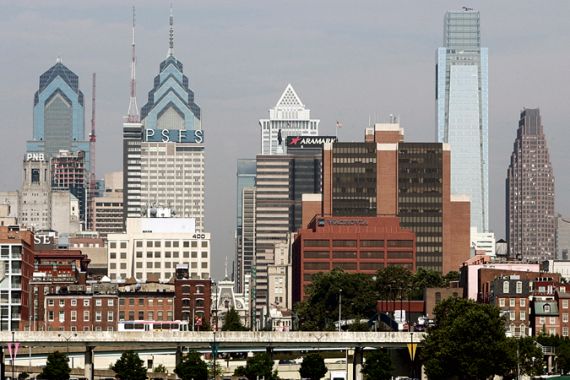The US public school system is under attack
In Philadelphia, the privatisation of the public school system isn’t working – yet the stage is set for even more.

New York, NY – The US public school system, once a model for the world, is under sustained attack by the nation’s elites. Philadelphia, the latest casualty, is getting ready to sell off its schools – and their governance – to profiteers and snake-oil salesmen. We already know how this story ends.
The Philadelphia school system announced in late April that it was on the brink of insolvency and would be turned over to private operators, dissolving most remnants of democratic governance. Specifically, if the city’s leaders have their way, 64 of the city’s neighbourhood public schools will close over the next five years, and by 2017, 40 per cent of the city’s children will attend charter schools. These are are privately run schools that use public funds. Perhaps most disturbingly to those who value democracy and doubt the wisdom of corporate elites, the city will have no oversight of its own school system. Schools will instead be governed by “networks”, control of which will be auctioned off through a bidding process, and could be bestowed on anyone – including a CEO of a for-profit education company.
Keep reading
list of 4 items‘We need you’: Solomon Islands’ support for US agency’s return revealed
‘Triple spending’: Zimbabweans bear cost of changing to new ZiG currency
‘We share with rats’: Neglect, empty promises for S African hostel-dwellers
The situation in Philadelphia, which has received amazingly little attention from the national media in the US, offers a disturbing window onto what the US elite is planning for the rest of our public schools – disturbing because Philadelphia’s experience has already demonstrated that turning public education over to private entities will ultimately lead to its destruction.
The fact is Philadelphia is already the most privatised system in the US. In 2001, the state of Pennsylvania took over the city’s school system and turned many of its schools over to private operators, even offering up 25 schools to for-profit companies. A study [PDF] by Vaughan Byrnes of Johns Hopkins University showed that, five years into this sweeping overhaul, the schools under private management were academically underperforming the public schools.
|
“In American public schools, privatisation and austerity are presented as solutions to problems largely caused by – wait for it – privatisation and austerity.” |
Not surprisingly, the bad education delivered by privatised education also comes with a heavy dose of corruption: at least six Philadelphia charter schools are under criminal investigation by the office of the state’s attorney general, after the Philadelphia Inquirer – and the city’s comptroller – reported rampant financial mismanagement and nepotism in the city’s charter system. As in other cities, public money was extensively abused in real estate profiteering schemes, as charter school operators used schools as tenants, paying money to themselves to rent their own property. In one particularly classy instance, the charter operator was running a private parking lot on school property. Exorbitant salaries were common for the charter school operators, and some implausibly held fully salaried jobs in multiple schools, billing the city for more than 365 days in a year. At least two Philadelphia charter school operators have pleaded guilty to one such series of frauds – with sentencing scheduled for July – and the Inquirer‘s investigations may lead to further prosecutions.
Austerity has been a crucial partner for privatisers in the United States, where New Orleans has endured an overhaul similar to Philadelphia’s, and school systems in New York and Chicago are suffering a more gradual erosion. Schools are starved of resources. Then the rich and their for-profit companies are brought in as white knights to “save” – or loot, whichever they prefer – the failing systems. In Philadelphia, according to the alternative City Paper, “it has been a long time since the schools had close to adequate funding”. Indeed, for years, the state of Pennsylvania fought a lawsuit, filed in 1999, by the city of Philadelphia, its school district and the National Association of Colored People (NAACP), charging the state with racial discrimination: the city’s schools, attended largely by poor children of colour, had been systematically under-funded, compared with suburban and rural districts, which are predominantly white.
To be sure, many of Philadelphia’s public schools are no place for children, and there is plenty of room for real reform. Unlike in New York City, most middle-class people in Philadelphia don’t choose to send their children to inner-city public schools, instead making great financial sacrifices to move to the suburbs. But only in the mad libertarian climate of current US politics could any sensible person believe that the destruction of the city’s schools will cure their woes.
In US public schools, privatisation and austerity are presented as solutions to problems largely caused by – wait for it – privatisation and austerity. But these are not solutions at all – just a recipe for more of the same.
Liza Featherstone is the education columnist for The Brooklyn Rail and a contributing writer to The Nation.
